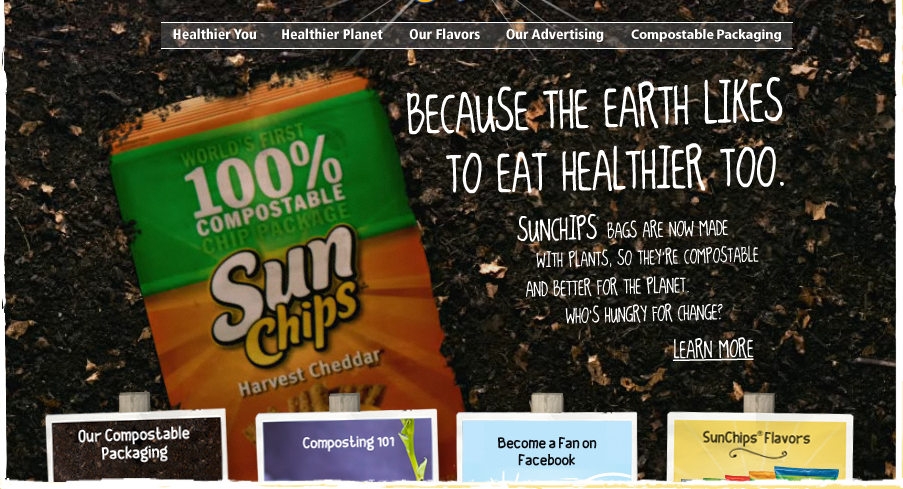The Green Versus the Eardrums
With rare yet significant exception, there’s a strong current of support for policies and products which help improve (or, at least, do less harm to) the environment. For example, Exxon Mobil shareholders recently voted to push the company toward more environmentally-friendly policies and Ford Motor Company’s chairman issued a statement in support of the Paris Climate Accord. And you can probably come up with a lot of other examples, too, off the top of your head. The list of corporations that have tried to go green — or greener — is virtually limitless.
Take, for example, this campaign from Sun Chips from 2010.

The bag above was a great idea — it was biodegradable. Unlike the plastic-y foil thing most chips come in, it promised to not last nearly forever in your neighborhood landfill. Instead, it promised to return to dust in about two weeks if composted. Frito-Lay, the makers of SunChips, understandably, played up the news — they had already positioned SunChips as their “healthier” snack option (yes, really) and now, per the image above, the snack was healthier for the Earth, too.
But there was a problem. The bags were loud — much louder than you’d expect. As Gizmodo explained, the bag of chips “crinkle[d] up to 95 decibels, about five dB higher than the level when you need to start worrying about sustained hearing loss.” (Here’s a brief video — 12 seconds — of some guy crinkling the compostable chip bag, in case you want to hear it for yourself.) That’s loud — about as loud as a lawnmower. Or, more to the point, it’s much louder than one’s voice during a normal conversation (60 dB), making eating and talking an impossible endeavor.
At first, Frito-Lay acknowledged that the bags sounded differently but played it off as a non-issue. But despite the good intentions and good ecology of the bag, customers weren’t fans. In short order, a Facebook page titled “SORRY BUT I CAN’T HEAR YOU OVER THIS SUN CHIPS BAG” hit 30,000 followers, YouTube found itself flooded with videos of people making loud noises with chip bags, and the press then picked up on the story. This was too much for the chip maker to ignore. As USA Today reported a few days later, Frito-Lay pulled the loud bags off the shelves in response, “returning [the chips] to their former bags that can’t be recycled — but won’t wake the neighbors — while it works[ed] frantically to come up with a new, quieter eco-friendly bag.”
The company apparently delivered on the promise of bags that were both Earth-friendly and ear-friendly; in 2011, per Fast Company, the company “discovered that a simple rubbery adhesive placed between the bag’s layers can cut its sound to 70 decibels.” That new bag rolled out shortly thereafter, but you wouldn’t know it; as of this writing, SunChip bags aren’t labeled as biodegradable. (As they still aren’t, we can’t be sure that they are, in fact, likely to break down quickly in a compost heap.)
Bonus fact: Open a potato chip bag and you’ll immediately notice that there are a lot fewer chips in there than the bag’s volume would suggest. That’s because there’s what appears to be an air cushion in the bag — and there is, kind of. The extra space is actually taken up by nitrogen, not just regular air (which is mostly nitrogen but also includes, importantly for our survival, oxygen). The nitrogen gives some much-needed padding to the fragile chips, allowing them to be transported without turning into crumbs. But regular air could do that — except it would make the chips go stale. As Indiana Public Media notes, “oxygen is very reactive and likes to combine with other molecules whenever it can, causing chemical changes to take place.” Nitrogen, on the other hand, doesn’t cause a reaction — it helps keep the chips fresh.
From the Archives: Attack of the Killer Potatoes: The snack food that you probably should avoid. Because it may kill you.
Related: A variety of SunChips.
